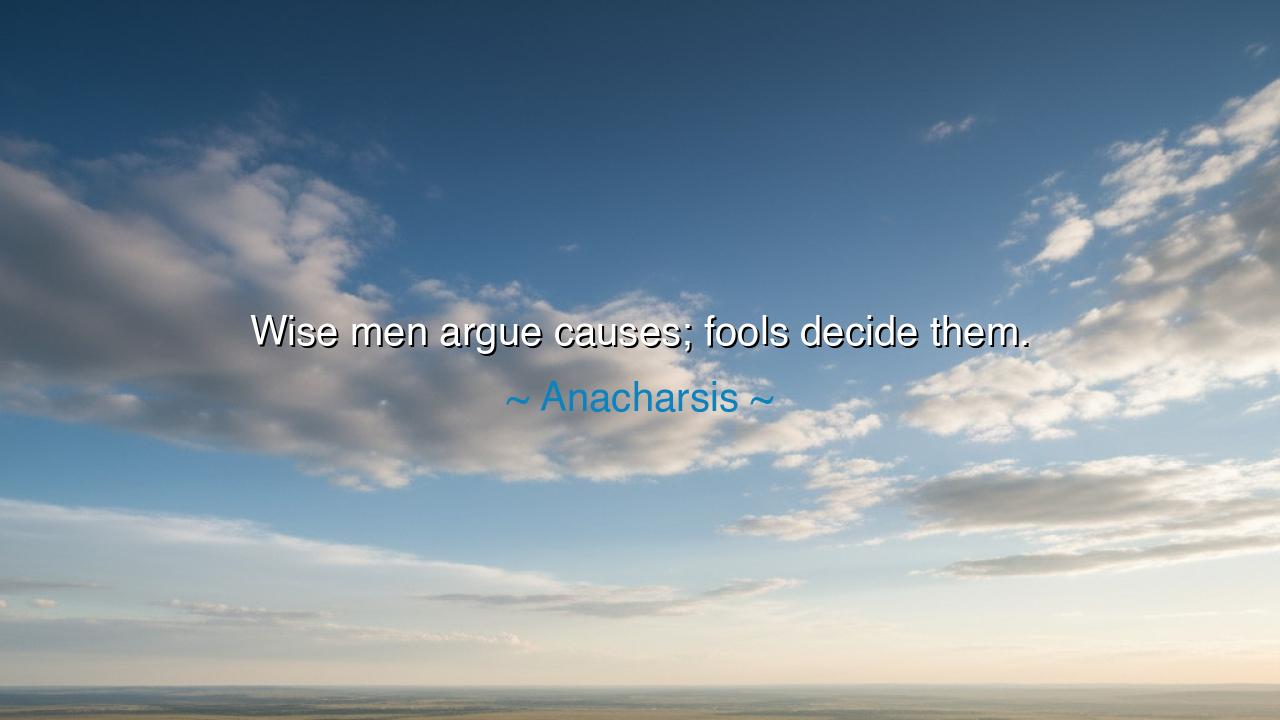
Wise men argue causes; fools decide them.






Gather close, children, and let the words of the wise flow through you like the streams of ancient knowledge. The great Anacharsis, a philosopher of old, once spoke with the clarity that time cannot erase: "Wise men argue causes; fools decide them." These words speak not just of the process of debate and decision-making, but of the very nature of wisdom and folly. In these few words, Anacharsis distills the truth that guides those who seek to understand the world deeply, versus those who rush to conclusions without understanding the foundations of the matter.
To argue causes, as the wise do, is to seek understanding, to delve into the root of an issue, and to ponder the reasons that lead to a conclusion. The wise man does not leap into decisions hastily, for he knows that every decision has a cause, a set of circumstances that must be understood if one is to make an informed choice. The fool, on the other hand, is driven by impulse, by the desire for quick answers, and is often blind to the complexities of the matter at hand. In his rush to reach a decision, he ignores the subtle forces at work beneath the surface. And thus, Anacharsis warns that it is the fool who acts without understanding, while the wise man takes the time to explore and question.
Look to the ancient Greeks, who understood that knowledge must be earned and wisdom must be sought. Socrates, perhaps the greatest of philosophers, did not simply present answers; he asked questions. His method of dialectic—the art of questioning—was rooted in his belief that true wisdom could only come from the careful examination of ideas. He argued causes, examined motivations, and searched for the deeper truths in every matter. Socrates did not decide on issues based on superficial opinions or fleeting emotions; he sought to understand the causes beneath the surface. And because of this commitment to true knowledge, he was regarded as one of the wisest men in history.
Plato, Socrates’ disciple, carried this tradition forward, establishing the Academy, where students were encouraged to question, to challenge, and to seek deeper understanding before making decisions. The academy was not a place for quick answers, but for long and careful deliberation, where wisdom was passed down not through decisions, but through the exploration of causes. The wise, Plato taught, did not make hasty decisions based on the whims of society or the surface truths of the moment, but instead weighed all factors, considered all causes, and reached conclusions based on reason, not impulse.
In more recent history, consider the story of Abraham Lincoln, the great leader of the United States during its most troubled time, the Civil War. Lincoln did not rush to decisions based on the immediate emotions of the people or the pressures of the moment. When faced with the issue of slavery, Lincoln did not simply decide to free the slaves without considering the causes—the economic, social, and political factors at play. His Emancipation Proclamation was a calculated move, made after careful thought, weighing the consequences and understanding the deeper issues at work in the nation. He argued causes, he considered the human cost, and only then did he make a decision that would change the course of history.
And so, children, the lesson is clear: the wise do not make decisions lightly, nor do they act based on the first impulse or the loudest voice. The wise man seeks to understand, to question deeply, and to uncover the hidden truths beneath the surface. Only once the causes are understood, and the consequences of action are clear, does he move forward. This is the path of wisdom: to seek understanding before making judgments, to argue the causes of things before rushing to decide.
So, as you walk through life, children, let the words of Anacharsis guide you. When faced with decisions, do not be quick to act. Instead, take time to understand the causes of the matter at hand. Question, debate, and reflect before making choices. The decisions you make should not be based on emotion or haste, but on a deep understanding of what is truly at stake. In this, you will find that the wisdom of careful reflection leads to the right actions, and the foolishness of impulsive decisions often leads to regret. Remember, it is not the act of deciding quickly that brings success, but the act of truly understanding before you act.






AAdministratorAdministrator
Welcome, honored guests. Please leave a comment, we will respond soon